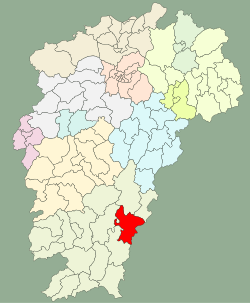This article needs additional citations for verification. (January 2017) |
You can help expand this article with text translated from the corresponding article in Chinese. (May 2022) Click [show] for important translation instructions.
|
Ruijin
瑞金市 Juicheng, Juiking | |
|---|---|
 Ruijin | |
 Location in Jiangxi | |
| Coordinates: 25°53′10″N 116°01′37″E / 25.886°N 116.027°E | |
| Country | People's Republic of China |
| Province | Jiangxi |
| Prefecture-level city | Ganzhou |
| Postal Code | 342500 |
| Ruijin | |||||||||
|---|---|---|---|---|---|---|---|---|---|
| Chinese | 瑞金 | ||||||||
| Postal | Juicheng | ||||||||
| |||||||||
Ruijin (Chinese: 瑞金; pinyin: Ruìjīn) is a county-level city of Ganzhou in the mountains bordering Fujian Province in the south-eastern part of Jiangxi Province. Formerly a county, Ruijin became a county-level city on May 18, 1994.
It was an early center of Chinese communist activity and developed a reputation as cradle of the Chinese revolution".[1]: 94 In the late-1920s, the Nationalists forced the Communists out of the Jinggang Mountains, sending them fleeing to Ruijin and the safety of its relative isolation in the rugged mountains along Jiangxi-Fujian border. In 1931, Mao Zedong founded the Chinese Soviet Republic (CSR) with Ruijin as its capital; it was called Ruijing by the CSR. The Communists withdrew in 1934 on the Long March after being surrounded again by the Nationalists.[citation needed]
During the Cultural Revolution, the Ruijin Massacre in September and October 1968 killed over 300 people in the county.
Ruijin is a popular destination for red tourism and ecotourism. It is a pilgrimage for Maoists from China and around the globe.
Administrative divisions
[edit]Ruijin City has 7 towns and 10 townships.[2]
- 7 Towns
|
|
- 10 Townships
|
|
Climate
[edit]| Climate data for Ruijin (1991–2020 normals, extremes 1981–2010) | |||||||||||||
|---|---|---|---|---|---|---|---|---|---|---|---|---|---|
| Month | Jan | Feb | Mar | Apr | May | Jun | Jul | Aug | Sep | Oct | Nov | Dec | Year |
| Record high °C (°F) | 27.9 (82.2) |
31.2 (88.2) |
31.7 (89.1) |
34.1 (93.4) |
35.8 (96.4) |
37.5 (99.5) |
40.4 (104.7) |
39.7 (103.5) |
37.4 (99.3) |
36.4 (97.5) |
33.5 (92.3) |
27.9 (82.2) |
40.4 (104.7) |
| Mean daily maximum °C (°F) | 13.5 (56.3) |
16.2 (61.2) |
19.2 (66.6) |
25.2 (77.4) |
28.9 (84.0) |
31.4 (88.5) |
34.3 (93.7) |
33.7 (92.7) |
31.0 (87.8) |
26.8 (80.2) |
21.6 (70.9) |
15.9 (60.6) |
24.8 (76.7) |
| Daily mean °C (°F) | 8.6 (47.5) |
11.2 (52.2) |
14.5 (58.1) |
20.2 (68.4) |
24.0 (75.2) |
26.7 (80.1) |
28.9 (84.0) |
28.2 (82.8) |
25.7 (78.3) |
21.0 (69.8) |
15.7 (60.3) |
10.2 (50.4) |
19.6 (67.3) |
| Mean daily minimum °C (°F) | 5.3 (41.5) |
7.8 (46.0) |
11.2 (52.2) |
16.5 (61.7) |
20.4 (68.7) |
23.4 (74.1) |
24.7 (76.5) |
24.5 (76.1) |
21.9 (71.4) |
16.8 (62.2) |
11.6 (52.9) |
6.3 (43.3) |
15.9 (60.5) |
| Record low °C (°F) | −5.2 (22.6) |
−2.5 (27.5) |
−2.1 (28.2) |
4.8 (40.6) |
11.4 (52.5) |
15.0 (59.0) |
19.4 (66.9) |
19.2 (66.6) |
12.5 (54.5) |
4.2 (39.6) |
−1.0 (30.2) |
−6.5 (20.3) |
−6.5 (20.3) |
| Average precipitation mm (inches) | 76.7 (3.02) |
103.8 (4.09) |
199.6 (7.86) |
192.3 (7.57) |
263.0 (10.35) |
268.3 (10.56) |
139.6 (5.50) |
157.4 (6.20) |
76.9 (3.03) |
47.7 (1.88) |
67.8 (2.67) |
55.1 (2.17) |
1,648.2 (64.9) |
| Average precipitation days (≥ 0.1 mm) | 10.8 | 12.8 | 18.8 | 17.0 | 18.0 | 17.5 | 12.5 | 15.1 | 9.2 | 6.0 | 8.1 | 8.4 | 154.2 |
| Average snowy days | 0.7 | 0.5 | 0 | 0 | 0 | 0 | 0 | 0 | 0 | 0 | 0 | 0.4 | 1.6 |
| Average relative humidity (%) | 79 | 80 | 82 | 79 | 80 | 80 | 73 | 76 | 77 | 75 | 77 | 76 | 78 |
| Mean monthly sunshine hours | 85.6 | 85.2 | 76.6 | 101.4 | 119.0 | 132.3 | 217.9 | 196.7 | 163.4 | 158.3 | 132.4 | 123.4 | 1,592.2 |
| Percent possible sunshine | 26 | 27 | 21 | 27 | 29 | 32 | 52 | 49 | 45 | 45 | 41 | 38 | 36 |
| Source: China Meteorological Administration[3][4] | |||||||||||||
Transport
[edit]On 22 May 2016 the BBC reported that four cars fell into a sinkhole in Ruijin City.[5]
References
[edit]- ^ Chatwin, Jonathan (2024). The Southern Tour: Deng Xiaoping and the Fight for China's Future. Bloomsbury Academic. ISBN 9781350435711.
- ^ "南京市-行政区划网 www.xzqh.org" (in Chinese). XZQH. Retrieved 2012-05-24.
- ^ 中国气象数据网 – WeatherBk Data (in Simplified Chinese). China Meteorological Administration. Retrieved 28 June 2023.
- ^ 中国气象数据网 (in Simplified Chinese). China Meteorological Administration. Retrieved 28 June 2023.
- ^ "Sinkhole swallows four cars in China". BBC News.